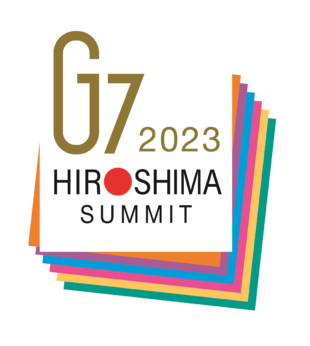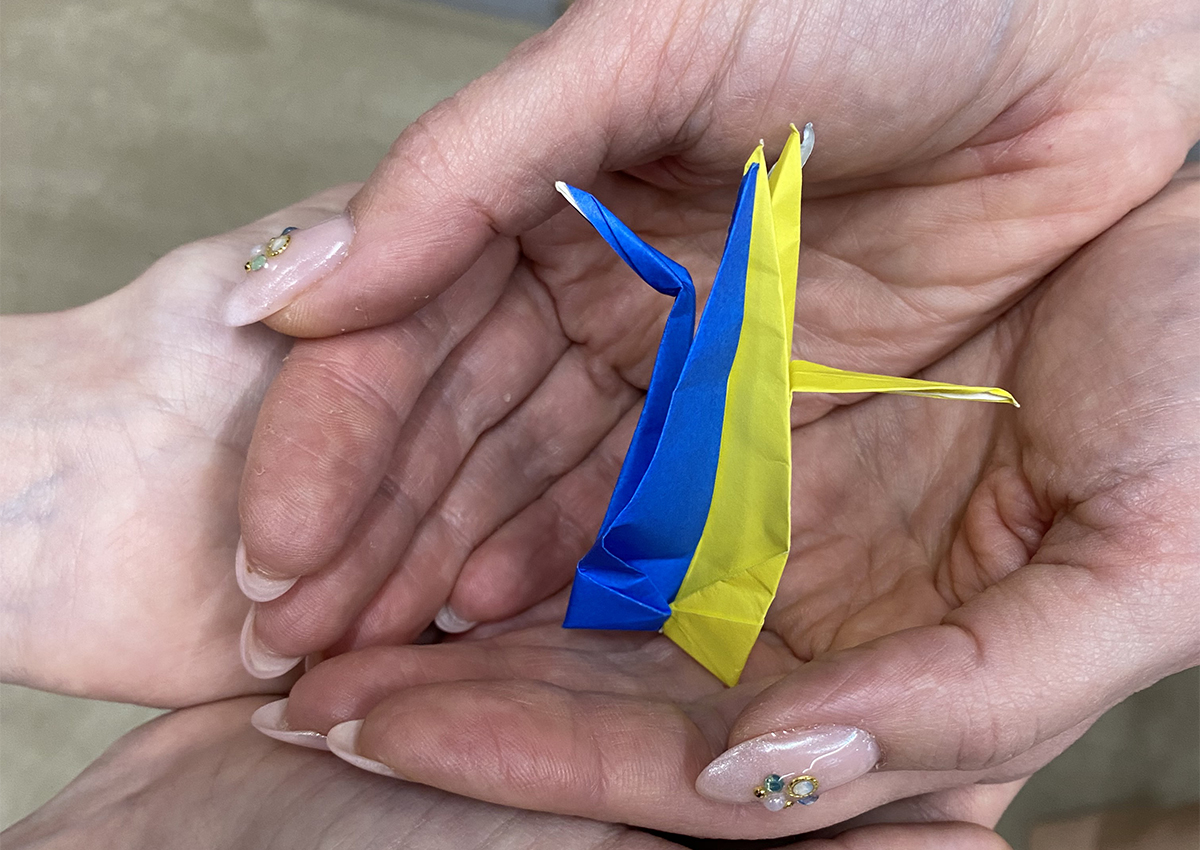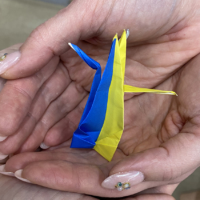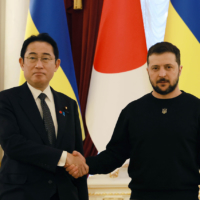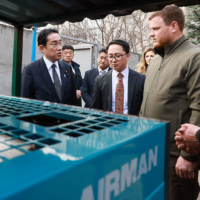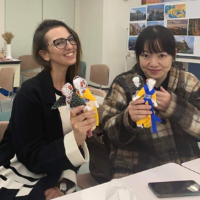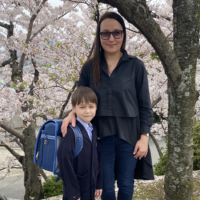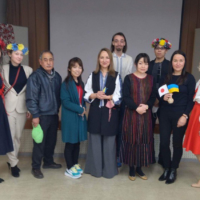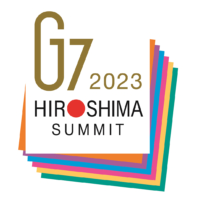The simmering conflict between Russia and Ukraine that actually began in 2014 exploded into a full-on invasion in late February 2022. Japan responded immediately, condemning Russia’s incursion and sending an array of financial, humanitarian and nonlethal aid to Ukraine. The exodus of refugees from the embattled nation desperate to escape the chaos has brought many Ukrainians to Japan. Prime Minister Fumio Kishida will be addressing the need for peace in Ukraine at the G7 summit in Hiroshima in May. He has also invited President Volodymyr Zelenskyy to participate virtually in the G7 proceedings as a special guest, since Ukraine will be a main agenda item at the summit.
Standing with Ukraine
At their March 21 summit meeting and working dinner in Kyiv, Kishida and Zelenskyy confirmed their solidarity in countering Russia’s aggression and condemned the illegal, unjustifiable and unprovoked incursion. In their joint statement on a special global partnership, the two leaders avowed that Russia’s actions undermine the very foundation of international order based on the rule of law, constitute a grave violation of the basic principles enshrined in the U.N. Charter — in particular the principles of sovereignty and territorial integrity — and directly threaten security, peace and stability in multiple regions.
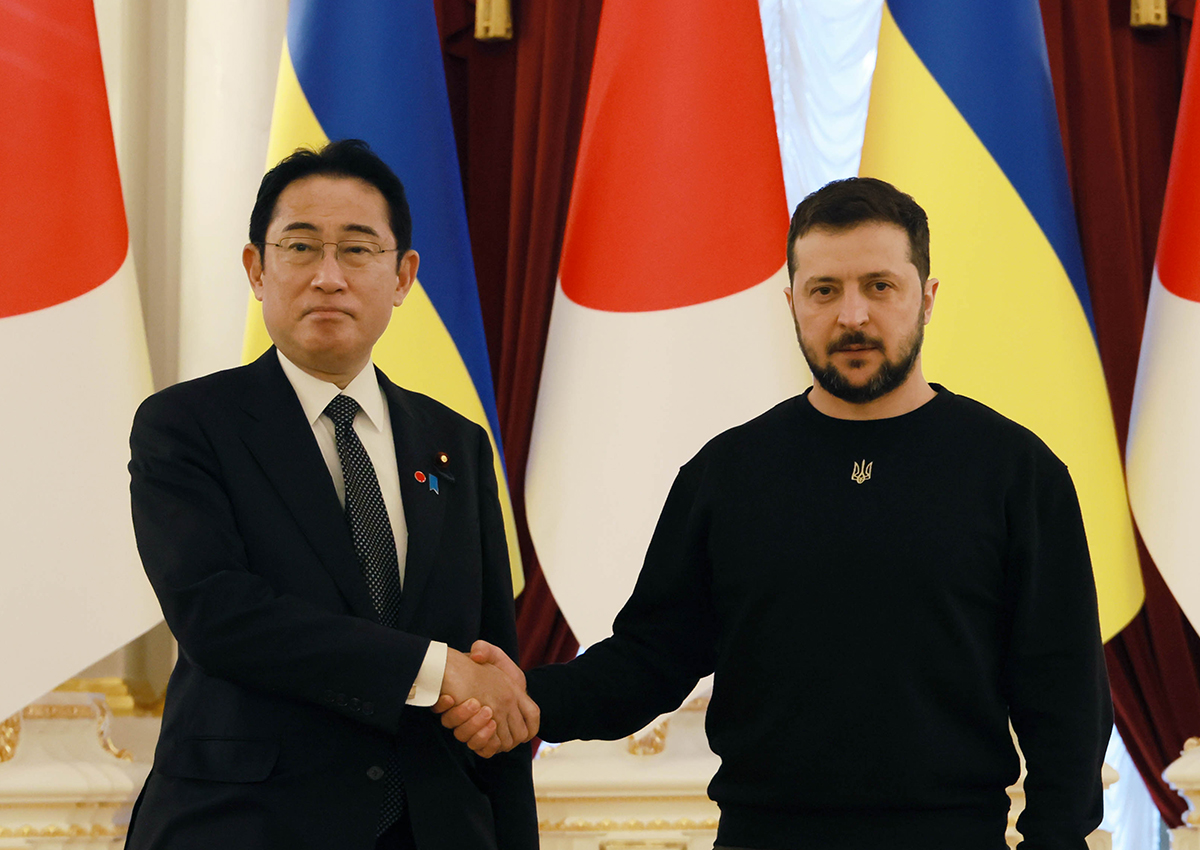
Poland is a staunch ally of Ukraine in this conflict. Kishida also visited Poland the day after, sitting down with Polish Prime Minister Mateusz Morawiecki. In response to the growing burden and vulnerability of neighboring countries caused by Russia’s prolonged aggression against Ukraine, Kishida stated he decided to provide official development aid directly to Poland to reduce that burden and effectively provide humanitarian, recovery and reconstruction assistance to Ukraine.
Japan’s groundswell of support for Ukraine so far has taken multiple forms. This includes $200 million in emergency humanitarian assistance to Ukraine and neighboring countries (to bolster health, medical care, food and protection) as well as about $500 million worth of humanitarian, recovery and reconstruction assistance for fiscal 2022. Japan has also provided $600 million in direct financial assistance to Ukraine.
Kishida stated that to supplement the humanitarian and financial assistance Japan has been providing since last year, which came to about $1.6 billion, about $5.5 billion more will be provided to underscore its solidarity with Ukraine on the first anniversary of Russia’s invasion.
Moreover, the prime minister indicated that the government has decided to provide additional financial support, and will be funding Ukraine in areas such as electric power, mine clearance and agriculture. He also announced that he will provide $470 million in new bilateral grant assistance for the energy sector and other areas, as well as $30 million for nonlethal equipment through NATO trust funds.
As the only country to have suffered atomic bombings in wartime, Kishida also said that Japan cannot accept the threat of nuclear weapons use by Russia, much less allow the 77-year record for nonuse to be broken. He stated that he would strongly communicate this point at the G7 Hiroshima Summit as well.
Grassroots assistance
On the humanitarian front, the Japanese government has supplied drones, bulletproof vests, helmets, winter clothing, tents, emergency rations and medical and other nonlethal equipment. To combat the winter cold, Japan worked through international organizations to provide generators and solar lanterns (worth some $2.57 million), reflectors and warmers for the Ukrainian National Police (worth around $550,000), and broadcasting equipment to the Public Broadcasting Company of Ukraine.
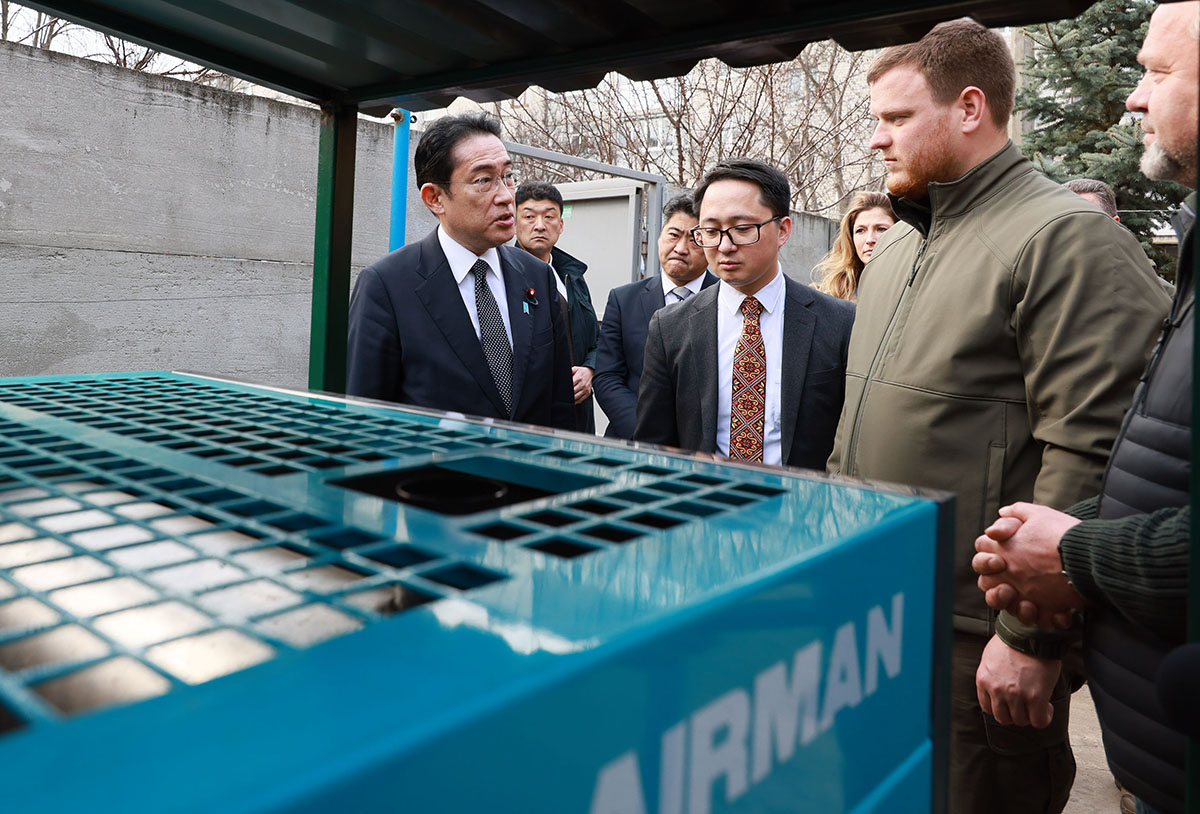
On the diplomatic front, Japan has offered to extend the stays of Ukrainian residents here and accept evacuees from Ukraine. Other assistance includes transportation of UNHCR humanitarian relief supplies by Self-Defense Forces aircraft, as well as social contributions in fields such as medical care and health.
As of April 19, Japan had taken in over 2,200 evacuees from Ukraine. Government support for them is comprehensive, from pre-entry support and immigration assistance at the airport to temporary housing, meals, transportation assistance, living expenses and medical care, along with Japanese-language education, work-related seminars and job-hunting assistance.
After refugees are handed over to municipalities, companies and other entities, the government provides continuing aid and support in many of the same areas. If there are relatives or acquaintances in Japan who will take in evacuees, they will act as guarantors and help the evacuees in their daily lives.
In the meantime, the government has withdrawn most-favored-nation status from Russia, prohibited the import of Russian machinery and other goods, placed sanctions on exports of semiconductors and other goods, and phased out or banned coal and oil imports from Russia, among other measures.
Extending a helping hand
The U.N. refugee agency reports that Russia’s invasion has forced an estimated 6 million people to be internally displaced, while more than 8 million had crossed into neighboring countries as of January.
Hiroshima Prefecture has expressed its willingness to accept evacuees from Ukraine and works in concert with municipalities and other entities that wish to take them in. The prefecture also accepts inquiries from residents and companies that are considering accepting or supporting evacuees. According to the February issue of the Hiroshima Municipal Government’s Peace Culture newsletter, Japan began welcoming Ukrainian evacuees in early April 2022, with the first of them arriving in the city at the end of April.
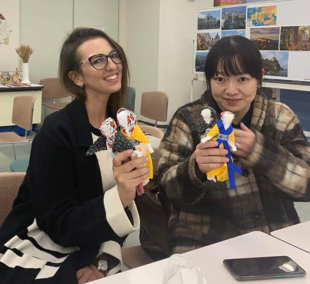
The prefecture has set up a consultation system (consultation, interpretation and other services in Ukrainian) at the Hiroshima International Center. It also has provided approximately 50 units of housing for free.
To support asylum seekers in their new lives, Hiroshima’s City Diversity and Inclusion Division set up a program that uses organizations who have been providing support to foreign residents regardless of nationality, as well as their know-how and resources.
This program has two main facets. One is to arrange interpreters for administrative procedures and daily life consultations at the Hiroshima City and Aki County Foreign Resident Consultation Center and for medical appointments. Evacuees planning to settle in Japan for a certain period of time must obtain visas at the Immigration Services Agency. The city sends an interpreter along to assist in this complicated process.
The second facet is to give evacuees opportunities to learn Japanese. Learning the language is essential for displaced persons who may settle in Japan to live independently. Without being able to speak Japanese, evacuees will face difficulties and inconveniences in daily life, and may become isolated. A certain level of Japanese proficiency is also required for work.
The City Diversity and Inclusion Division usually holds introductory Japanese language classes for foreign residents at the International Conference Center Hiroshima. In addition, they offer tutoring in the language free of charge.
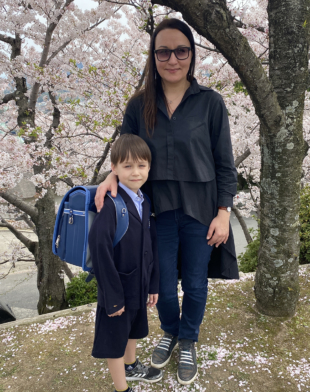
The staff meets with evacuees several times weekly over several months in classrooms for tutorials, and can usually spot any problems and respond appropriately in cooperation with the city and other related agencies.
After acquiring the minimum necessary Japanese for daily life in beginners’ classes, students will continue their studies with people in the community. The city hopes many residents will take a neighborly interest in the evacuees and other foreign residents and take the first step to extend a warm hand.
An essential bridge
Anastasia Khotina, a teacher and web designer from Cherkasy, Ukraine — the cultural, educational and industrial center of Cherkasy Oblast and the Central Economical Region of Ukraine — came to Japan in 2002. She now lives in Hiroshima, where she raises awareness about Ukrainian culture and its charms in Japan via radio, presentations and events. In February 2022, she was instrumental in launching the Hiroshima Ukrainian Association, which supports people in Ukraine and those who have evacuated to Japan, exchanges information and supports protests against Russia. It also works with Ukrainian communities across Japan.
The association holds events once a month to introduce Ukrainian cuisine, culture and history, and to raise funds. Anastasia has acted as a bridge between Japanese who know the current situation in Ukraine and want to help but do not know what to do, and Ukrainians who need help. “A lot of people have expressed their sympathy and encouragement, and have come to support us,” she said.
The refugees include people dear to Anastasia — her sister, Daria, and Daria’s family. “There is no safe place in Ukraine,” Daria explained. “I was terrified for my children, so I decided it would be better to take them to a safe country. My sister and her husband helped us get here, and we are extremely grateful for that.”
Exhibiting the resilience now closely associated with the people of Ukraine, Daria explained that the only difficulty they’ve had so far is with the language. “We’ve been trying to learn it, but it is very difficult.”
The government readily stepped in. “We are constantly receiving support,” she said. “We received help with language-learning, getting a private teacher to work with us, and were provided with housing. My youngest son got enrolled in a kindergarten and now he is going to school. We are very thankful for all the help!”
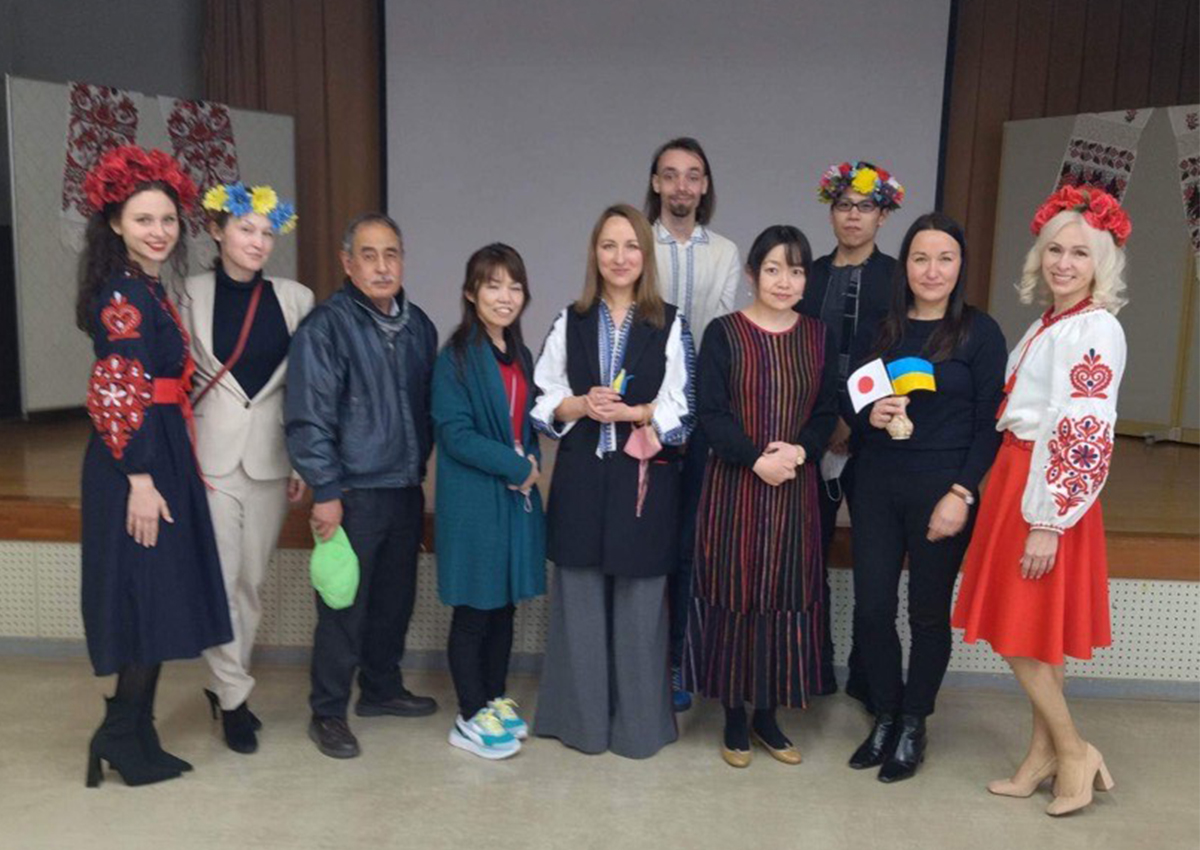
An appeal for support
Japan is the only country to suffer nuclear attacks, which creates a certain affinity between the two nations, given the atomic bombs that struck Hiroshima and Nagasaki and the nuclear accident in Chernobyl. What role does Anastasia think Japan can play to bring peace to Ukraine?
“Over the past year, many people have taken an interest in Ukraine and offered to help, but Ukraine has been fighting for the past eight years,” Anastasia said. “If more countries had shown that they were on Ukraine’s side earlier, it might have prevented an invasion. To prevent further casualties, it is important for all countries to unite and express their support for Ukraine. For that reason, I want to do my best in Japan now, communicate the ‘heart’ of Ukraine through art and culture, and appeal our identity as an independent country.”
When asked about her hopes and aspirations for the G7 Summit, Anastasia is frank: “Simply ending the current war is not the goal. We need a long-term, large-scale framework that will ensure the security of the people of Ukraine and its surrounding countries for many years to come. As the host of this year’s G7 Summit, I would like Japan to demonstrate leadership and call on other countries to provide more active support.”
Anastasia also wants to be sure that the people in Japan who are advocating for peace and justice in Ukraine know one thing. “I’m deeply grateful that many lives were saved thanks to the warm support of the Japanese people. I will never forget that you reached out to us when we were in trouble. There is still no end in sight to the war, but I would like to ask for your continued assistance to Ukraine — above all, assistance to protect people’s lives and enable them to live with peace of mind.”
This page is sponsored by the government of Japan.
